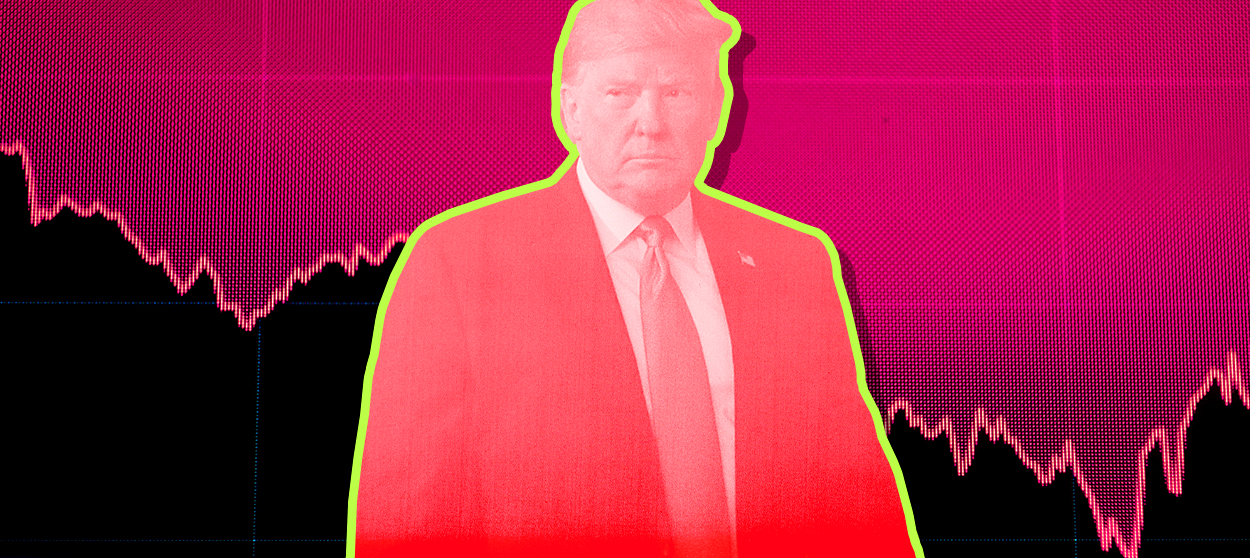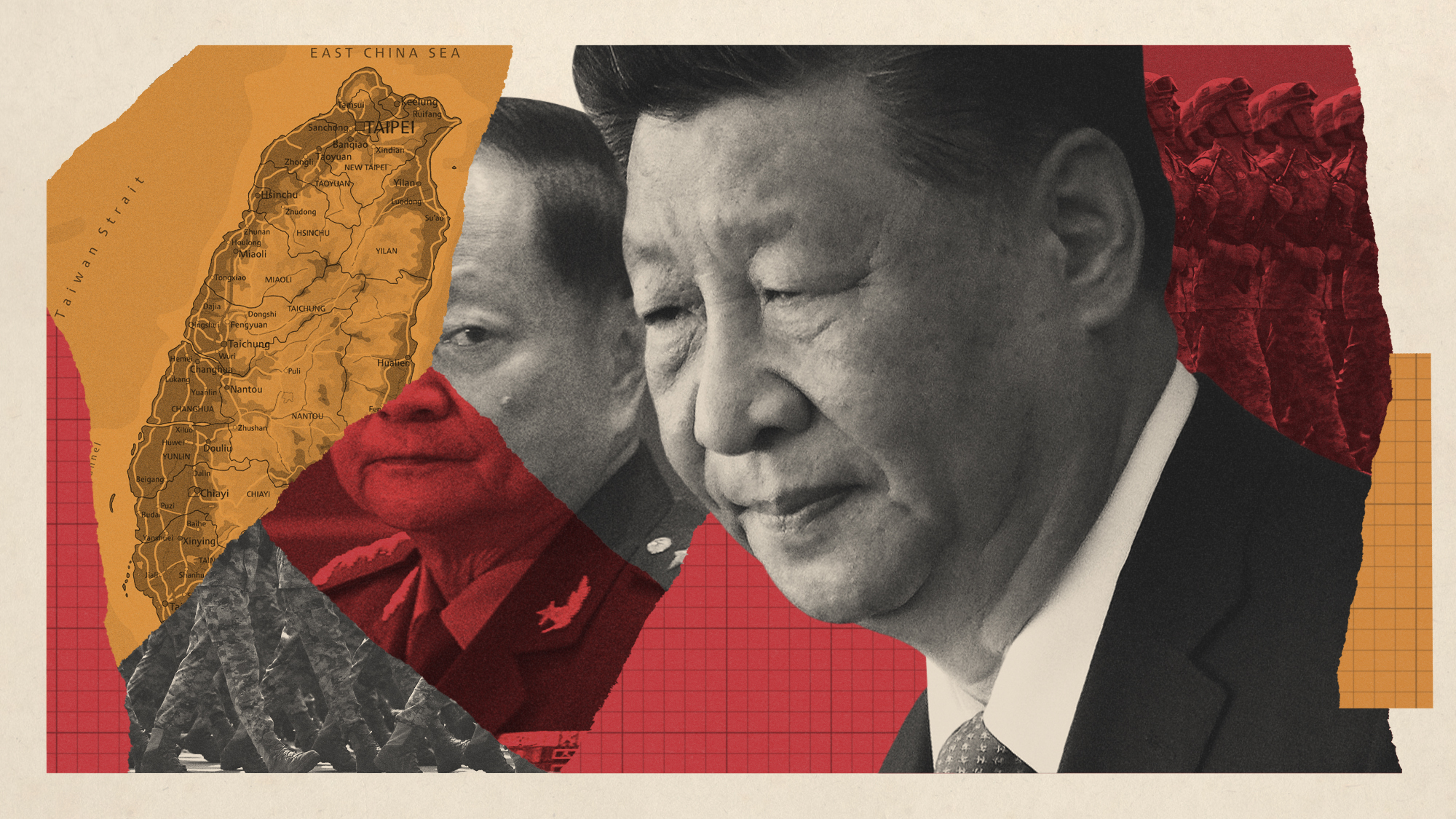China just showed why Trump can't win with tariffs
An escalating tariff war is a losing strategy, but there's another way


A free daily email with the biggest news stories of the day – and the best features from TheWeek.com
You are now subscribed
Your newsletter sign-up was successful
China opened up a new front in President Trump's trade war on Monday, sending Wall Street into a tizzy.
Basically, China's central bank adjusted the value of its currency down to its lowest point in over a decade. Investors, fearing President Trump will respond with another tariff escalation, reacted by fleeing stocks for the safety of bonds and Treasuries — causing the S&P 500 and the Nasdaq to fall 3 percent and 3.5 percent, respectively, by the end of the day. And they're likely right. Yet it's also the case that the low value of the renminbi versus the U.S. dollar really is a problem worth addressing.
So is there any way America can combat China's currency machinations without a tariff war and the ensuing market panic? It turns out, there may be.
The Week
Escape your echo chamber. Get the facts behind the news, plus analysis from multiple perspectives.

Sign up for The Week's Free Newsletters
From our morning news briefing to a weekly Good News Newsletter, get the best of The Week delivered directly to your inbox.
From our morning news briefing to a weekly Good News Newsletter, get the best of The Week delivered directly to your inbox.
Right now, as we all know, Trump is relying on tariffs to carry out his trade war. The primary strategy here is to browbeat China into accepting various reforms. But thus far, China hasn't been overly inclined to cooperate, and Trump's tariff threats keep escalating: He's already imposed 25 percent tariffs on $250 billion worth of Chinese exports to the U.S. And last week, he threatened a 10 percent tariff on another $300 billion worth, which would basically make every last dollar of Chinese exports subject to U.S. duties.
The drop in China's currency is a problem for this strategy because it largely neutralizes the pain of Trump's tariffs. The whole idea behind the tariffs is to raise the cost of Chinese exports in the domestic American market, so that Americans buy less of them. But a fall in the value of China's currency lowers the cost of those exports for Americans, thus offsetting the tariffs' effect. Indeed, the People's Bank of China explicitly said the new, lower value target was retaliation for the "unilateralism and trade protectionism measures and the imposition of increased tariffs on China." Trump promptly took to Twitter to rage about "currency manipulation."
The thing is, the Trump administration hasn't come up with any responses other than to impose even more tariffs on Chinese exports to punish drops in the renminbi. Beyond simply repeating the same strategy and hoping for a different outcome, this perpetual upward ratchet of tariffs is precisely what freaks out the markets. Tariffs disrupt specific industries with specific supply chains, invite retaliatory tariffs that do the same, and generally cause a great deal of headaches for investors.
Beyond all that, Trump's tariffs have also failed to rebalance the flow of trade between the U.S. and China — ostensibly the larger goal of the president's economic confrontation with our neighbor to the east. Our trade deficit with China has actually increased since Trump's trade war commenced.
A free daily email with the biggest news stories of the day – and the best features from TheWeek.com
Bottom line: the tariffs have brought a lot of pain for both sides while achieving little. Trump needs an alternative. And several are readily available.
When China's central bank engineers a drop in its currency, what it's doing in concrete terms is buying up financial assets denominated in U.S. dollars. That increases demand for the dollar, hiking its value relative to the renminbi. Bringing the two currencies back into a closer balance requires responding to those purchases in some fashion.
One option is to discourage the buying. For example, the U.S. government could impose a fee or tax on all foreign purchases of U.S. assets. Instead of slapping a tariff on Americans buying Chinese goods and services, we'd essentially slap a tariff on Chinese buyers purchasing U.S. financial instruments. Sens. Tammy Baldwin (D-Wis.) and Josh Hawley (R-Mo.), for example, just put forward a bill that would give the Federal Reserve a new additional mandate to balance America's trade flows with the world within five years. And the tool they give the Fed to do this is a new fee to be imposed on all foreign purchases of U.S. stocks and bonds and so forth — effectively making it more expensive for China to engage in this sort of manipulation.
Now, Wall Street would probably hate this idea. To a certain extent, wealthy investors don't like any government efforts to intervene in trade flows because they just want to be left alone. But it should have minimal effects on the real economy. America is awash in cheap financial capital with or without Chinese investors.
Another option is to get even more surgical: America could buy up Chinese financial assets until the effect of their purchases of our assets are counterbalanced. In short, if China (or anyone else) raises the value of the U.S. dollar relative to their currency by creating demand for our assets, we can raise the value of their currency relative to ours by buying their assets, and neutralize the whole affair. Indeed, the easiest way to do this might be to take the same route Baldwin and Hawley did: Direct the Federal Reserve to bring our trade flows into balance by buying up financial assets denominated in China's renminbi, or in the currency of any other country our trade flows are out of whack with due to these sorts of interventions.
This would be even less disruptive than charging a fee for foreign purchases of our assets. Investors here and around the world could still buy whatever they wanted without interference; the Fed would simply be participating in the global markets with more strategic intention. As for the real economy, business models and supply chains would simply adjust to changing currency rates, which — in our ostensible global free market for currency exchanges — they already do.
Finally, these aren't just tools for prosecuting a trade war with China. They are tools for reforming America's trade flows with the entire world. Estimates suggest the U.S. dollar needs to fall by anywhere from 6 percent to 30 percent to resolve our trade imbalances with the globe. Tariffs are, at best, a horribly indirect method of adjusting currency values, and they do a lot of collateral damage. There are better ways to cut to the heart of the matter.
Jeff Spross was the economics and business correspondent at TheWeek.com. He was previously a reporter at ThinkProgress.
-
 Switzerland could vote to cap its population
Switzerland could vote to cap its populationUnder the Radar Swiss People’s Party proposes referendum on radical anti-immigration measure to limit residents to 10 million
-
 Political cartoons for February 15
Political cartoons for February 15Cartoons Sunday's political cartoons include political ventriloquism, Europe in the middle, and more
-
 The broken water companies failing England and Wales
The broken water companies failing England and WalesExplainer With rising bills, deteriorating river health and a lack of investment, regulators face an uphill battle to stabilise the industry
-
 The UK expands its Hong Kong visa scheme
The UK expands its Hong Kong visa schemeThe Explainer Around 26,000 additional arrivals expected in the UK as government widens eligibility in response to crackdown on rights in former colony
-
 ‘Hong Kong is stable because it has been muzzled’
‘Hong Kong is stable because it has been muzzled’Instant Opinion Opinion, comment and editorials of the day
-
 What do Xi’s military purges mean for Taiwan?
What do Xi’s military purges mean for Taiwan?Today’s Big Question Analysts say China’s leader is still focused on reunification
-
 What is at stake for Starmer in China?
What is at stake for Starmer in China?Today’s Big Question The British PM will have to ‘play it tough’ to achieve ‘substantive’ outcomes, while China looks to draw Britain away from US influence
-
 ‘It’s good for the animals, their humans — and the veterinarians themselves’
‘It’s good for the animals, their humans — and the veterinarians themselves’Instant Opinion Opinion, comment and editorials of the day
-
 The billionaires’ wealth tax: a catastrophe for California?
The billionaires’ wealth tax: a catastrophe for California?Talking Point Peter Thiel and Larry Page preparing to change state residency
-
 What is China doing in Latin America?
What is China doing in Latin America?Today’s Big Question Beijing offers itself as an alternative to US dominance
-
 Bari Weiss’ ‘60 Minutes’ scandal is about more than one report
Bari Weiss’ ‘60 Minutes’ scandal is about more than one reportIN THE SPOTLIGHT By blocking an approved segment on a controversial prison holding US deportees in El Salvador, the editor-in-chief of CBS News has become the main story
